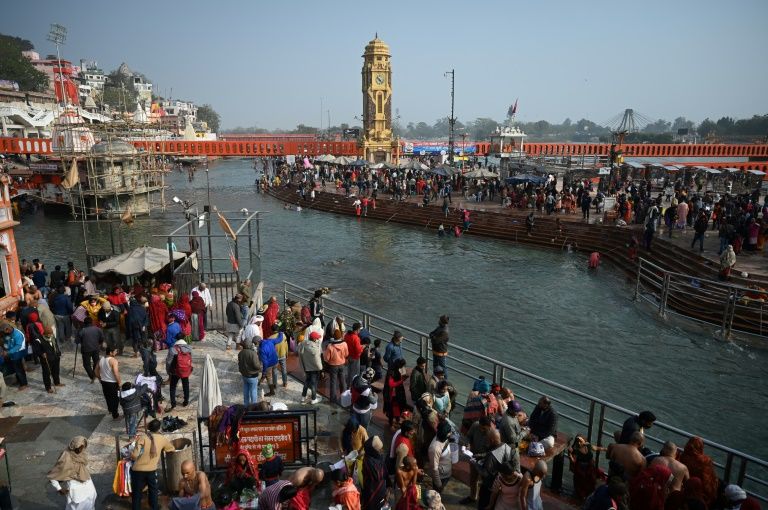Coronavirus fails to deter India’s massive Ganges pilgrimage
Several million people are expected to throng Haridwar over the coming seven weeks. ©AFP Money SHARMA
Haridwar (India) (AFP) – Hindu pilgrims descended on the banks of the Ganges river Thursday, shrugging off Covid-19 risks for the start of the Kumbh Mela, a religious festival that regularly attracts millions.
India’s severe outbreak — the second most coronavirus infections in the world, and more than 150,000 deaths — has not stopped devout Hindus from making the pilgrimage to Haridwar in northern India.
“The pandemic is a bit of a worry, but we are taking all precautions,” said organiser Siddharth Chakrapani, who expected between 800,000 and a million people to attend on Thursday alone.
“I’m sure Maa Ganga will take care of their safety,” he added, referring to the river considered holy by the faithful.
According to Hindu mythology, gods and demons fought a war over a sacred pitcher containing the nectar of immortality. Drops fell at four different locations, which now alternate as hosts for the immense gatherings.
Kumbh Mela is recognised as a piece of intangible cultural heritage by UNESCO, and its last edition — in Allahabad in 2019 — attracted around 55 million people over 48 days.
This year, beginning Thursday, Haridwar is the host, and several million people are expected to throng the holy city in Uttarakhand state over the coming seven weeks.
– ‘Not like Europe’ –
Taking a dip in the Ganges is considered a sacred rite by Hindus, who come from across India and beyond its borders to participate.
Holy men known as sadhus — boasting outrageous dreadlocks and smoking cannabis — are a regular feature at the Kumbh Mela, camping by the river and offering blessings to those who come for the holy immersion.
On Wednesday, the river’s banks teemed with pilgrims and vendors while families laid out plastic sheets to put their belongings on while they took turns to plunge in the river.
Most were oblivious to the threat of coronavirus.
“India is not like Europe… when it comes to immunity we are better,” said 50-year-old pilgrim Sanjay Sharma.
“It’s really sad to see people not gathering at Kumbh in the same numbers as they would earlier — just because of a sneeze or a cough.
“The greatest truth on earth is death. What’s the point of living with fear?”
But fellow pilgrim Lakshmi Sharma, 37, said she was still being careful.
“It’s a joyful time since it’s the Kumbh. We just have to try and maintain distance and keep sanitising our hands since it’s a pandemic,” she told AFP.
This week brings several other religious festivals in India, including the Gangasagar in Kolkata where officials expect around 15,000 people.
Madurai in the southern state of Tamil Nadu is due to host a bull-chasing carnival known as Jallikattu, where revellers grab hold of the beasts’ horns as they run through crowds of people.
While life is gradually returning to normal in the world’s second most populous country, experts warn a new wave of coronavirus could hit.
Disclaimer: Validity of the above story is for 7 Days from original date of publishing. Source: AFP.


